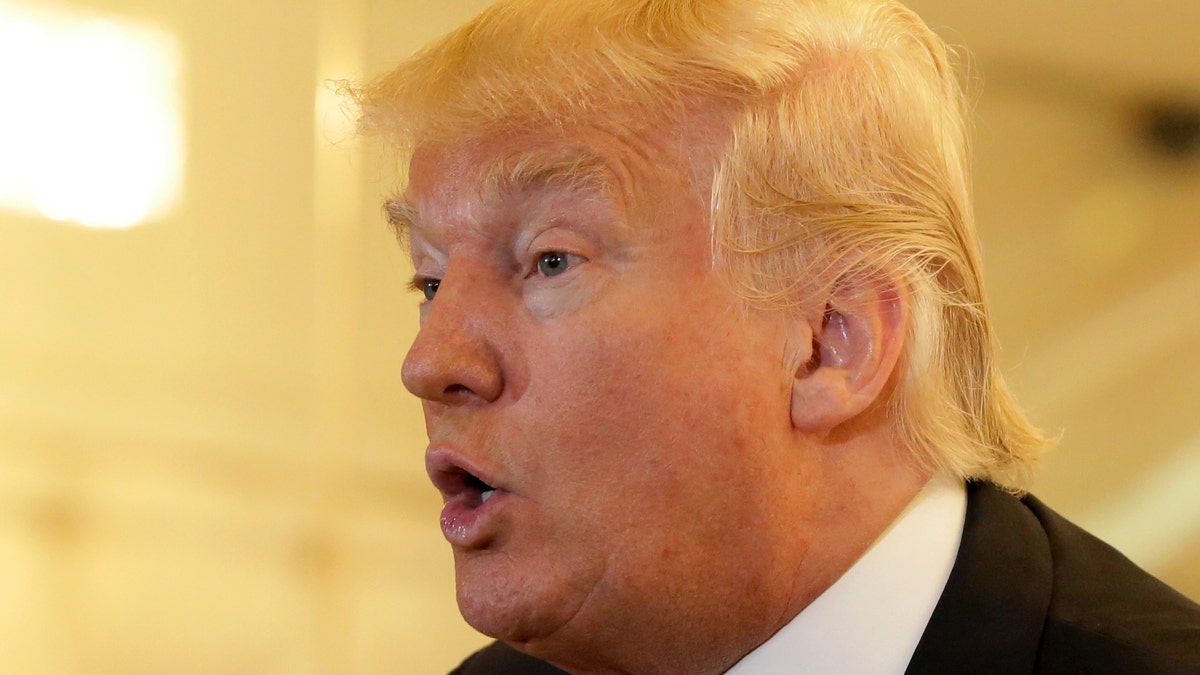
FILE - Republican presidential candidate Donald Trump speaks during a news conference in New York, Tuesday, May 31, 2016. (AP Photo/Richard Drew)
After President Obama’s attempts to rule by “pen and phone,” President Donald Trump will face a profound question.
Undoubtedly, he will reject some of the prior administration’s bad policies. But will he also repudiate the Obama administration’s unlawful means of imposing policy?
What are these unlawful means?
Most of the rules that entangle Americans nowadays are issued not by Congress, but by Executive Branch agencies. This mode of government is called “administrative power,” and it makes a mockery of the Constitution and of the ideal of representative government.
To be sure, the shell of a republic remains, but within it a very different sort of government has arisen.
President Obama’s defining domestic legacy will be not merely his policies, good or bad, but his exuberant use of administrative power to adopt policies without the accountability of legislating in Congress. He did not invent this mode of power, but more than any of his predecessors, he has revealed its profound danger.
In imposing its Clean Power Plan, which threatens the coal industry and inflicts tens of billions of dollars in costs on the electrical industry, Obama’s Environmental Protection Agency did not propose legislation to Congress. Instead it issued a novel rule “interpreting” an alleged ambiguity in a statute—an interpretation that suddenly gave the agency power over energy generation across the country.
The Department of Education did not even issue a rule when it recently redefined “sexual harassment” on campuses so as to restrict speech relating to sex. Instead, it instituted this policy merely as “guidance” in a smarmy “Dear Colleague” letter that it sent to academic institutions.
None of this is law. Instead, it is executive diktat.
The Constitution places all legislative powers in Congress, leaving no room for other federal bodies to exercise legislative power. Nonetheless, binding legislation increasingly comes from the Executive Branch in the form of agency rules, interpretations, and guidance.
These are unconstitutional, for they have not been enacted in Congress by the people’s representatives. Congress alone possesses the lawmaking power. In contrast, the Chief Executive can merely veto the laws, and if he does not do that, his job is to “faithfully execute” them.
As a result, President Trump’s defining domestic challenge will be what he does about administrative power.
Many lawyers assume that, to reverse Obama-era policies, President Trump will have to use the same unlawful mechanisms as his predecessor. From this perspective, he can overturn the administrative interpretation that creates the Clean Power Plan only by issuing new administrative interpretation, and he can reverse the administrative guidance that suppresses campus speech only by issuing additional guidance.
If he takes this path, without addressing the unlawful means of lawmaking, he will merely slow the administrative tide--without preventing it from flooding back when he leaves office.
But if he goes beyond policy reversals and actually dismantles the mechanisms of administrative power, his presidency will be transformative.
Trump therefore should seize the opportunity to return the United States to its constitutional pathways of power. Most basically, he should require agencies, one by one, to submit their existing rules to Congress, so they can be adopted as statutes. And he should require congressional enactment of any future agency rules.
As for bureaucratic guidance and other interpretation, it has binding effect only because the courts defer to it, instead of exercising their own independent judgment.
President Trump should therefore ask government lawyers not to seek deference for agency interpretations and guidance, lest they participate in a due process violation. He thereby would terminate not only bad policies but also the unconstitutional methods by which they are adopted and sustained in court.
Of course, if President Trump is to cut back on administrative power, he will have to persuade Congress and the courts to do their jobs.
He will have to force Congress to enact laws rather than leave lawmaking to agencies. And he will have to persuade judges to abandon their deference to agency interpretation and guidance and, instead, exercise their own judgment in interpreting the law.
But this would be no more than they are supposed to do.
If President Trump fails to do this, administrative power will remain a profound threat to civil liberties and a stultifying burden on the lives of all Americans.
Now is the time for real change: Not just a transient shift in policy, which might be reversed by the next administration, but an enduring reestablishment of constitutional governance.
If President Trump seizes the opportunity, his administration will be of historic importance, and he will secure a legacy that transcends all particular policies.
And if he does not, the opportunity may never come again.








































